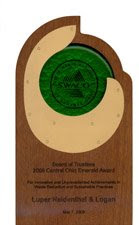by Amanda Bucha
The world of recycled paper can be a confusing place. From Forest Stewardship Council (FSC) certified paper to paper with 100% recycled post consumer content, it can be difficult to determine which one is truly the most environmentally friendly. The following information should help anyone on a venture into this uncharted territory.
Recycled paper comes in a variety of forms, so it’s important to familiarize yourself with the available options. Having this knowledge will allow you to make an informed decision and to select the paper that meets your environmental goals.
Paper companies will often refer to the content of recycled or reprocessed materials that were used to make the paper. This content is typically measured as a percentage of the total weight of the paper. There are two types of content -- Post-consumer content and Pre-consumer content.
Post-consumer content paper contains materials that were once consumer items. These various items served their purpose and are then changed into post-consumer recycled fibers. For example, the paper you throw into the recycle bin will later be used to make post-consumer recycled paper.
In contrast, Pre-consumer content paper is made up of the scraps that were left over when the paper was being made. This type of material never became a consumer item, but it wasn’t discarded either. Instead, it was used to make new paper. For example, the leftover pulp that is used to make paper at a paper mill, is theoretically picked up off the floor and turned into pre-consumer content paper.
When looking at the content of recycled materials, it’s important to look at the percentage. This will usually appear near the recycled paper symbol. The higher the percentage, the more eco-friendly the paper will be. If your goal is to attain the most environmentally friendly of the two, then most agree that your choice should be “post-consumer” paper with 100% recycled content.
When you see the Forest Stewardship Council Certified (FSC) logo on paper materials, this means that the paper comes from forests that have been managed responsibly and in an environmentally conscious way. In order to become certified, these forests must be managed in accordance to strict rules enforced by the FSC. However, it’s important not to assume that this paper is recycled. For example, FSC papers can contain 0% recycled content. The message that the FSC logo sends to the consumer is that the forests and environment are not being harmed by the paper making process. Much of the FSC certified paper that is available does contain recycled content. Again, if the goal is to attain the most environmentally friendly paper, then the FSC paper with the highest recycled content is the best FSC paper.
Finally, more and more paper products are coming from non-tree sources. For example, cotton, hemp, and agricultural waste are being used with more frequency. If you are concerned about the loss of trees in paper production, then purchasing paper made from non-tree sources will be an important consideration.
The most eco-friendly paper will contain 100% post-consumer recycled content. If you are using paper that is FSC certified, make sure that at least 50% of the content is coming from post consumer recycled sources.
To conclude, the best thing you can do to reduce your impact is to follow three simple steps. First, reduce the amount of paper you are using by implementing double sided copying policies, creating a paperless workflow by using email or using fax programs that are combined with email accounts, and encourage employees to cut down on unnecessary paper usage. Second, recycle the paper you do use. Finally, use the most environmentally friendly paper you can find.
Hopefully these guidelines will help you on your quest in the “new paper era”.
Read more!





